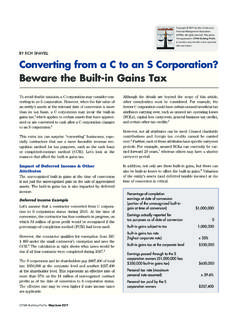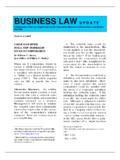Transcription of Medical Expenses and the S Corporation - Ed Zollars
1 Extra, Extra, Read All About Medical PlansPodcast of June 10, 2006 Feed address for Podcast subscription: page for Podcast: 2006 Edward K. Zollars , CPAThe TaxUpdate podcast is intended for tax professionals and is not designed for those not skilled in independent tax research. All readers and listeners are expected to do their own research to confirm items raised in this presentation before relying upon the positions presented. The Podcast and this document may be reproduced freely so long as no fee is charged for the use of this document. Such prohibited use would include using this podcast or document as part of a CPE presentation for which a fee is podcast is sponsored by Leimberg Information Services, located on the web at Leimberg Information Services offers email newsletters on tax related matters, as well as access to a library of useful information to tax practitioners that subscribe to their Expenses and the S CorporationThe IRS issued a headliner on their website on May 15 for tax professionals that was picked up by most tax services, and has created concern for practitioners who have clients with S Corporation clients that are pure one person operations.
2 The coverage has suggested that unless the insurance policy is issued in the name of the S Corporation , there will be no deduction under 162(l) for the self-employed health insurance deduction. In today s podcast we ll consider the impact of Revenue Ruling 61-146 on the analysis found in this provision that we take a look at in this podcast is Section 162(l), which provides(l) Special rules for health insurance costs of self-employed individuals (1) Allowance of deduction (A) In general- 1 -Extra, Extra, Read All About Medical PlansPodcast of June 10, 2006 In the case of an individual who is an employee within the meaning of section 401(c)(1), there shall be allowed as a deduction under this section an amount equal to the applicable percentage of the amount paid during the taxable year for insurance which constitutes Medical care for the taxpayer, his spouse, and dependents.
3 (B) Applicable percentage For purposes of subparagraph (A), the applicable percentage shall be determined under the following table:For taxable years beginning The applicablein calendar year -- percentage is --1999 through 2001 602002 702003 and thereafter 100. (2) Limitations (A) Dollar amount No deduction shall be allowed under paragraph (1) to the extent that the amount of such deduction exceeds the taxpayer's earned income (within the meaning of section 401(c)) derived by the taxpayer from the trade or business with respect to which the plan providing the Medical care coverage is established. (B) Other coverage Paragraph (1) shall not apply to any taxpayer for any calendar month for which the taxpayer is eligible to participate in any subsidized health plan maintained by any employer of the taxpayer or of the spouse of the taxpayer.
4 The preceding sentence shall be applied separately with respect to-- (i) plans which include coverage for qualified long-term care services (as defined in section 7702B(c)) or are qualified long-term care insurance contracts (as defined in section 7702B(b)), and (ii) plans which do not include such coverage and are not such contracts. (C) Long-term care premiums In the case of a qualified long-term care insurance contract (as defined in section 7702B(b)), only eligible long-term care premiums (as defined in section 213(d)(10) shall be taken into account under paragraph (1).- 2 -Extra, Extra, Read All About Medical PlansPodcast of June 10, 2006 (3) Coordination with Medical deduction Any amount paid by a taxpayer for insurance to which paragraph (1) applies shall not be taken into account in computing the amount allowable to the taxpayer as a deduction under section 213(a).)
5 (4) Deduction not allowed for self-employment tax purposes The deduction allowable by reason of this subsection shall not be taken into account in determining an individual's net earnings from self-employment (within the meaning of section 1402(a)) for purposes of chapter 2. (5) Treatment of certain S Corporation shareholders This subsection shall apply in the case of any individual treated as a partner under section 1372(a), except that -- (A) for purposes of this subsection, such individual's wages (as defined in section 3121) from the S Corporation shall be treated as such individual's earned income (within the meaning of section 401(c)(1)), and (B) there shall be such adjustments in the application of this subsection as the Secretary may by regulations well, the headliner references 1372, which provides the following.
6 (a) General ruleFor purposes of applying the provisions of this subtitle which relate to employee fringe benefits-- (1) the S Corporation shall be treated as a partnership, and (2) any 2-percent shareholder of the S Corporation shall be treated as a partner of such partnership.(b) 2-percent shareholder definedFor purposes of this section, the term "2-percent shareholder" means any person who owns (or is considered as owning within the meaning of section 318) on any day during the taxable year of the S Corporation more than 2 percent of the outstanding stock of such Corporation or stock possessing more than 2 percent of the total combined voting power of all stock of such HeadlinerThe document the IRS posted reads as follows:Headliner Volume 163- 3 -Extra, Extra, Read All About Medical PlansPodcast of June 10, 2006 15, 2006In many solely owned businesses, the owner of the business will purchase health insurance in his or her own name versus the name of the business.
7 The type of entity may greatly affect where this insurance premium expense may be deducted on the individual s personal income tax Chief Counsel Advice (CCA) 200524001, it was held that a self-employed individual who is a sole proprietor and who purchases health insurance in his or her own name may treat that as health insurance purchased in the name of the sole proprietor business. As such, the insurance would qualify under the provisions of IRC 162(l). Assuming the self-employed individual meets the other provisions of IRC 162(l), the individual may claim a deduction for the insurance premiums in arriving at his or her adjusted gross income; also referred to as an above-the-line deduction. In contrast, if the business is operating as an S Corporation , there is a different tax consequence if the individual who is the sole shareholder and sole employee, purchases the health insurance in his or her own certain fringe benefits paid by the S Corporation , including health insurance premiums, the Internal Revenue Code (IRC) holds that the S Corporation will be treated as a partnership and any shareholder who owns more than 2% (a 2% shareholder) of the S Corporation stock will be treated as a partner of such partnership (IRC 1372(a)).
8 Revenue Ruling 91-26 holds that accident and health insurance premiums paid by a partnership on behalf of a partner are guaranteed payments under 707(c) of the Code if the premiums are paid for services rendered in the capacity of a partner and to the extent the premiums are determined without regard to partnership income. As guaranteed payments, the premiums are deductible by the partnership under 162 (subject to the capitalization rules of 263) and includible in the recipient-partner's gross income under such, the health insurance premiums paid by the S Corporation would not be deductible by the S Corporation as a fringe benefit but would be deductible by the S Corporation as compensation to the 2% shareholder. The health insurance premiums paid by the S Corporation for the 2% shareholder should be included in the 2% shareholder s W-2.
9 IRC 162(l)(5) holds that a 2% shareholder that is treated as a partner under IRC 1372 will be treated as a self-employed person and, assuming all of the other provisions of IRC 162(l) are met, may deduct the health insurance premiums paid by the S Corporation as an above-the-line deduction. It should be remembered that there are some limitations under - 4 -Extra, Extra, Read All About Medical PlansPodcast of June 10, 2006 162(l)(2). The one that often affects a 2% shareholder deals with other coverage. An above-the-line deduction is not allowed for any calendar month for which the shareholder is eligible to participate in any subsidized health plan maintained by any other employer of the shareholder or of the spouse of the there are no other subsidized health plans, the problem arises if the sole shareholder/ employee purchases the health insurance in his or her own name instead of that of the S Corporation .
10 In that case, the S Corporation has not established a plan to provide Medical care coverage, there is no fringe benefit paid to the 2% shareholder and the provisions of IRC 1372 do not come into play. Since the provisions of 1372 do not come into play, the S Corporation is not treated as a partnership and the shareholder is not treated as a partner. Since the shareholder is not treated as a partner, the shareholder is not treated as self-employed and is not eligible for the above-the-line deduction treatment under IRC 162(l). The shareholder is still able to deduct the health insurance as an itemized deduction which is subject to the AGI states do not allow a Corporation to purchase a group health plan with only one participant. This prevents the S Corporation from acquiring a health plan and it requires the shareholder to purchase the plan in his or her own name.






